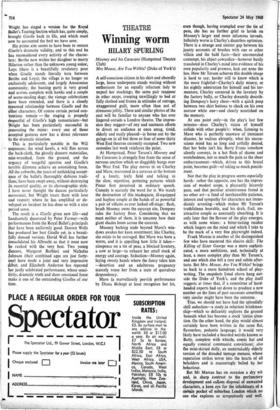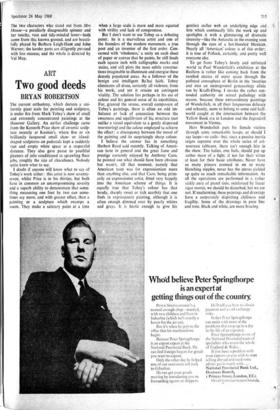THEATRE
Winning worm
HILARY SPURLING
Mrs Mouse, Are You Within? (Duke of York's) A self-conscious citizen in his shirt and absurdly large, loose underpants stands waiting without enthusiasm for an equally reluctant lady to unpeel her stockings; the same pair reappear in other snaps, creeping unwillingly to bed or fully clothed and frozen in attitudes of outrage, exaggerated guilt, more often than not of strenuous jollity. These and similar photos of the cast will be familiar to anyone who has ever lingered outside a London theatre. The impres- sion they suggest—of coy and unctuous efforts to divert an audience at once smug, timid, elderly and easily pleased—is borne out by the goings-on in all but three or four of some thirty West End theatres currently occupied. Two new comedies last week reinforce the point.
At Hampstead, Peter Terson's Mooney and his Caravans is strangely free from the sense of nervous unction which so sluggishly hangs over the West End. The play moves in on Charley and Mave, marooned in a caravan at the bottom of a lonely, leafy field and talking in the slow, repetitive, pottering patterns which Pinter first perceived in ordinary speech. Comedy is scarcely the word for it. We watch the destruction of this inadequate, ill-equipped and hapless couple at the hands of as powerful a pair of villains as ever lurked off-stage : flash, brash Mooney owns the caravan site, Dempsey rules the factory floor. Considering that we meet neither of them, it is uncanny how their giant shades loom across the caravan.
Mooney bathing nude beyond Mave's win- dows awakes her keen resentment; like Charley, she exists to be outraged. But Mave was born a worm, and it is appalling how little it takes- ninepence on a tin of peas, a blocked lavatory, a cow at large—to exhaust her small stock of energy and courage. Seduction—Mooney again, laying sweaty hands where the fancy takes him —desertion and an adulterous pregnancy scarcely rouse her from a state of querulous despondency.
Mave (a marvellously peevish performance by Diana Bishop) at least recognises her lot,
even though, having crumpled over the tin of peas, she has no further grief to lavish on Mooney's larger and more infamous inroads. Infinitely worse is Charley's dauntless optimism. There is a strange and sinister gap between his jaunty accounts of brushes with one or other villain and the bald facts—their unconcealed contempt, his abject cowardice—however busily translated in Charley's mind into evidence of his own popularity and prowess, leak out none the less. How Mr Terson achieves this double image is hard to say; harder still to know which is the more frightful—Charley's daily misery, or his nightly admiration for himself and his tor- mentors; Charley cornered in the lavatory by the factory bully, or Charley dreamily describ- ing Dempsey's hairy chest—with a quick peep between two shirt buttons to check on his own narrow white one—and clearly nourished on the memory.
At one point only—in the play's last few minutes—does Charley's vision of himself collide with other people's: when, listening to Mave who is perfectly unaware of imminent disaster, he realises abruptly, what his uncon- scious mind has so long and artfully denied, that her baby isn't his. Barry Evans somehow silently conveys, in a hot flush of shame and wretchedness, not so much the pain as the sheer embarrassment—which, driven to this brutal point, becomes guilt—of taking so much punish- ment.
Not that the play in progress seems especially harsh : rather the opposite, one has the impres- sion of modest scope, a pleasantly leisurely pace, and that peculiar attentiveness found in no other art—a fund of inexhaustible patience, interest and sympathy for characters not imme- diately arresting—which makes Mr Terson's truthfulness bearable, and his drab, frail, un- attractive couple so constantly absorbing. It is only later that the flavour of the play emerges, as with some wines : a bitter-tasting residue which lingers on the mind and which I take to be the mark of a very fine playwright indeed.
Frank Marcus is another of the distinguished few who have mastered this elusive skill: The Killing of Sister George was a more sophisti- cated, a more ambitious, and, technically at least, a more complex play than Mr Terson's, and one which also left a rare and subtle after- taste. But Mrs. Mouse, Are You Within? brings us back to a more humdrum school of play- writing. The snapshots listed above hang out- side the Duke of York's, and the play itself suggests at times that, if a committee of hard- headed experts had sat down to produce a new number on the lines of past successes something very similar might have been the outcome.
True, we should not have had the splendidly chill seduction—a study in reluctant brinkman- ship—which so delicately explores the ground beneath what has become a stock 'sixties situa- tion. On the other hand, the play would almost certainly have been written in the same flat, flavourless, pedantic language; it would very likely have included a bearded weirdo known as Batty, complete with whistle, comic hat and equally comical communist convictions; also the mini-skirted dolly, an unmistakably elderly version of the dreaded teenage menace, whose reputation strikes terror into the hearts of all beholders and is reassuringly belied by her behaviour.
But Mr Marcus has on occasion a dry wit and, in sharp contrast to the perfunctory development and callous disposal of unwanted characters, a keen eye for the inhabitants of a certain pocket of suburban London which no one else explores so scrupulously and well. The two characters who stand out from Mrs Mouse—a peculiarly disagreeable spinster and her touchy, vain and tidy-minded lover—both come from this known ground, and are beauti- fully played by Barbara Leigh-Hunt and John Warner; the harder parts are diligently pursued with less success; and the whole is directed by Val May.







































 Previous page
Previous page